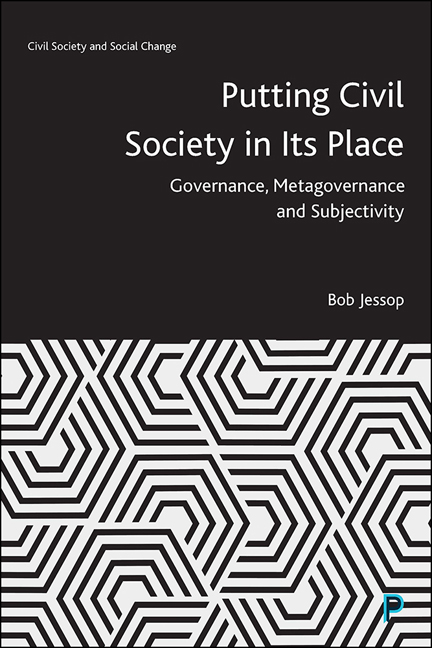Book contents
- Frontmatter
- Dedication
- Contents
- List of Tables and Figures
- Abbreviations
- Note on the Author
- Acknowledgements
- Licensing Information
- Preface
- 1 Introduction
- Part I Complexity, Contingency and Governance
- Part II Locating Civil Society as a Mode of Governance
- Part III Governance Failure and Metagovernance
- Endnotes
- References
- Index
11 - Conclusions
Published online by Cambridge University Press: 18 March 2021
- Frontmatter
- Dedication
- Contents
- List of Tables and Figures
- Abbreviations
- Note on the Author
- Acknowledgements
- Licensing Information
- Preface
- 1 Introduction
- Part I Complexity, Contingency and Governance
- Part II Locating Civil Society as a Mode of Governance
- Part III Governance Failure and Metagovernance
- Endnotes
- References
- Index
Summary
Civil society has been a basic concept (Grundbegriff) in political theory from the early modern period in Europe onwards, and has been approached from many philosophical, theoretical and normative perspectives. It is also a key reference point in political strategies and political contestation. More recently, it has become a policy paradigm in the sense that civil society, the third sector, public–private partnerships, solidarity and community (and cognate referents) are seen as important vectors for policy delivery, often in response to disquiet about market failure and state failure. In turn this is reflected in the integration of civil society in various guises into modes of governance. As this has occurred, attention has turned to the limits of civil society as a mode of governance and the attempts to improve it in this regard or to find ways to flank and support it, including new forms of selfresponsibilization and subjectivation, new dispositives (apparatuses) and new discourses. This book has reviewed these different facets of ‘civil society’ to establish the linkages and disjunctions between them. It then focused on the policy paradigm, mode of governance and responses to governance failure aspects. Of special interest is the churning of attempts to mobilize civil society as an instrument of state power, the recurrent failures of participation and communitarianism, the attempts to explain this away and the new policy responses and modes of governance that follow from this.
There are also ethical questions about the duties and obligations of political actors, about the best forms of political life, community and state, about the best ways to reconcile the individual and the social, private interests and public ethics, egoism and altruism, individual passions and public reason, and so on. Thus, Seligman sees ‘the core component of the classical theory of civil society as an ethical vision of social life’ (1992: 10) – a vision that, ‘if it does not overcome, at least harmonizes, the conflicting demands of individual interest and social good’ (Seligman, 1992: x).
The limitations of this interpretation are shown in John Keane's history of how the conceptual distinction between state and civil society has developed through four overlapping ethico-political stages: (1) a sovereign, centralized constitutional state standing over its subjects versus a series of independent societies that can check the state's authoritarian potential;
- Type
- Chapter
- Information
- Putting Civil Society in Its PlaceGovernance, Metagovernance and Subjectivity, pp. 219 - 236Publisher: Bristol University PressPrint publication year: 2020

